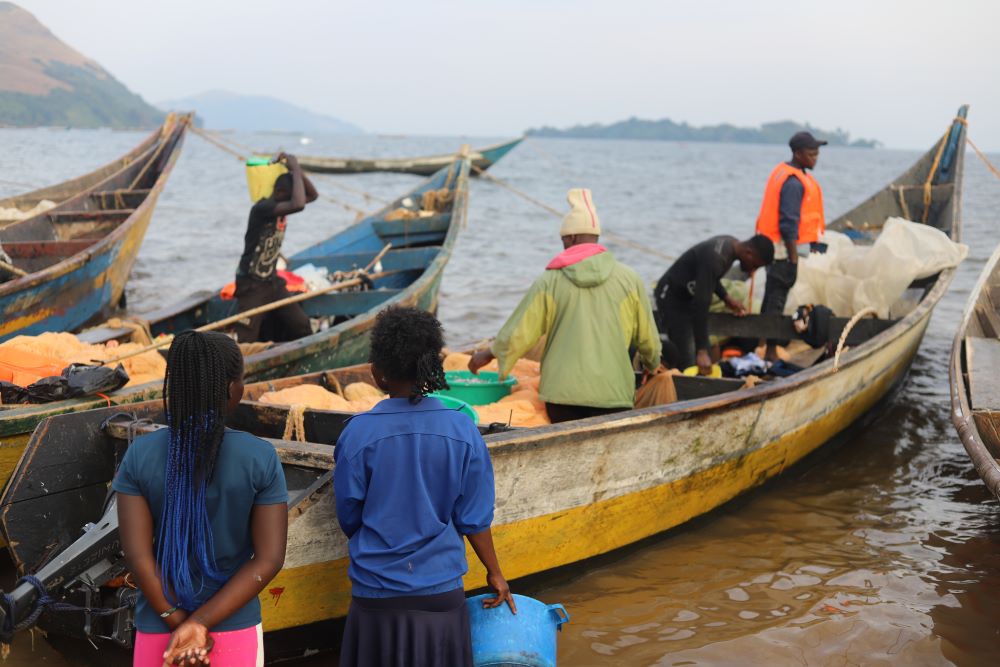
Young women on the shores of Lake Victoria in western Kenya are buying fish as boats return from fishing on July 17. The majority of girls as young as 12 say they have been sexually exploited by fishermen as they try to sustain or improve their livelihoods. (GSR photo/Doreen Ajiambo)
In the early morning light of this small town in western Kenya and beyond, boys as young as 5 years old aren't heading to school — rather, they make their way to nearby Lake Victoria to fish.
Fishing is the primary economic activity in Port Victoria, a town on the shores of Lake Victoria along the Kenya-Uganda border. Here, fishing takes precedence over education. Young boys often serve as the primary providers for their families, while young girls are often responsible for household chores and perhaps cleaning, processing or selling fish.
"I had to stop going to school at a young age and began fishing to support my family after my father passed away when I was born," explained 17-year-old Joseph Ahadi as he readied his fishing nets. "This is the reality for most children here: Working and earning money to provide for your family comes first, and education comes later."
Like most children his age, Ahadi dropped out of school in the third grade; he stands by his decision. When Ahadi was 11, his uncle introduced him to fishing as a way to support their family. Working with other children under his uncle's guidance, they catch a variety of fish, including Nile perch, tilapia, silverfish and other local species.
"We have no other options but to work here. Life is tough, and we are paid very little for long hours of work," he said, noting that they fish after dark and endure cold nights on the lake. "When we started, we were promised a better life in exchange for our hard work. Our employers assured us good money that would transform our lives, but that promise has yet to be fulfilled."
Authorities are sounding the alarm about the growing exploitation of child labor by employers in the region, raising the issue in schools, churches, government and local events, markets, and other gatherings.
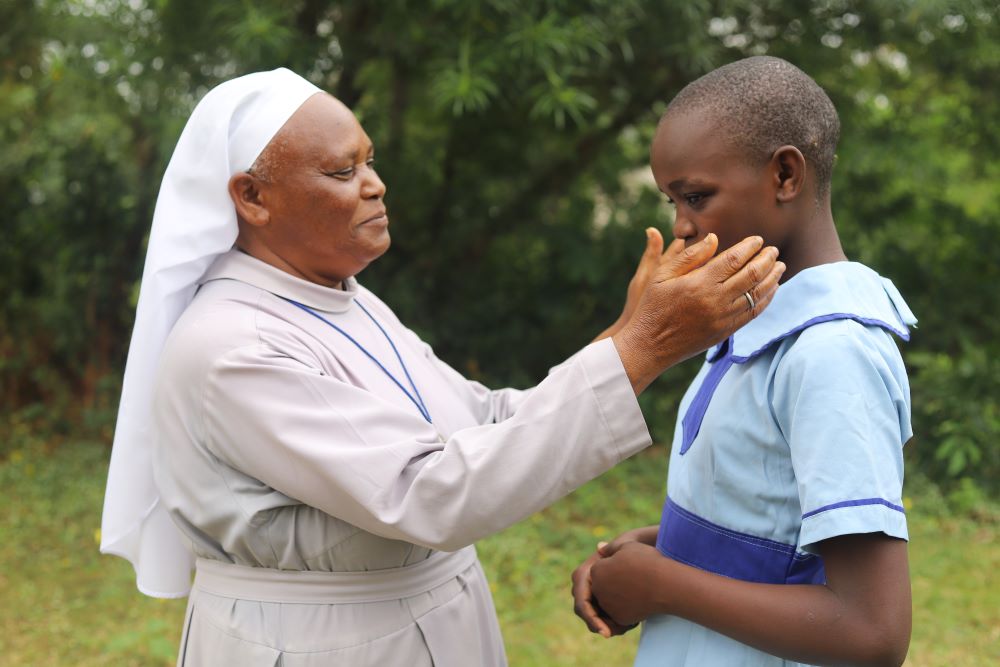
Sr. Bernadette Nthenya of the Sisters of Mary of Kakamega interacts with a girl she rescued from selling fish on the shores of Lake Victoria. She provided the girl the opportunity to attend school at the institution she operates in Port Victoria, a town in western Kenya. (GSR photo/Doreen Ajiambo)
Sr. Bernadette Nthenya, an advocate for children's education around Lake Victoria, expressed concern about the situation. If the issue of children leaving school to work along the lake shores is not addressed, she said, Lake Victoria, meant to uplift the livelihoods of the people living around it, will end up hindering development in the long run.
The nun highlighted poverty as the primary cause driving thousands of children to abandon their education and resort to fishing or cheap labor along the lake shores. She stressed that the allure of quick cash at the beaches is leading to alarming rates of school absenteeism and dropouts.
"In this area, a large number of people live in poverty and rely on Lake Victoria for their survival," said Nthenya, a member of the Sisters of Mary of Kakamega. "As a result, many children grow up in impoverished households. Providing the basic necessities of life is already a daunting task, and when education is factored in, it becomes even more challenging."
Arthur Papa Odera, deputy governor of Port Victoria's Busia County, told Global Sisters Report that "parents have been neglecting their responsibilities and willingly allowing their children to work in the fishing industry.
"Some children are even being exploited by their parents to work as laborers, with the entire catch being handed over to them to sell," he said. "This situation breaches child labor laws and child care policies, and is destroying the futures of these children."
The rise of child labor
Global Sisters Report conducted interviews at multiple landing sites on Lake Victoria, uncovering widespread use of child labor in fishing activities across the region.
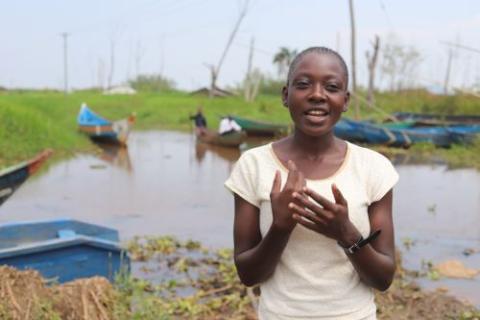
Eunice Nabwire, 19, left school at a young age to work in fishing in order to support themselves and their families. She said she became pregnant at 16 years after being coerced by fishermen to engage in sex in exchange for fish. (GSR photo/Doreen Ajiambo)
Of the 10 fishermen found across different landing sites, seven were children as young as five years old. The interviews revealed that most of these children had lost at least one parent, and many were responsible for providing for their families.
The authorities said that most of the parents died from HIV/AIDS while engaging in the same work as their children. Research indicates that people living in fishing communities around Lake Victoria are at a higher risk of HIV infection and have a greater HIV prevalence compared to the general population due to several factors, including the practice of trading fish for sex.
Nthenya emphasized fishing activities at the lake were threatening the future of many children in the area and other regions.
"The majority of girls in the region engage in premarital sex, often exchanging their bodies for fish to sell or for survival, leading to high rates of HIV and early pregnancies," she said. "Most families here also practice polygamy, leading to high rates of child neglect and exploitation."
While perched on a fishing boat on the shores in Port Victoria, a 13-year-old child told GSR that he never had the opportunity to attend school.
"When I was very young, my parents took me to the lake to teach me how to fish. I don't see any issue with this since it's a common activity for children here."
GSR witnessed children performing tasks similar to adult fishermen. Here, boys are coerced to work long hours, especially at night and in cold temperatures, as it is believed to be the best time for fishing. They are also made to carry heavy loads, such as fishing nets.
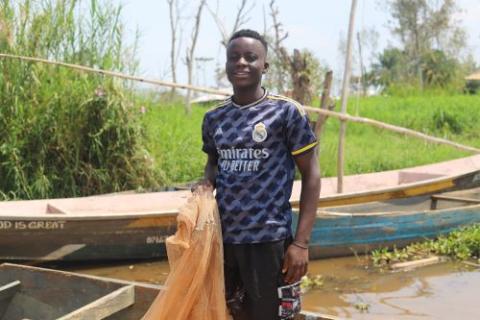
Joseph Ahadi, 17, cleans his fishing nets after a day and night of fishing on July 17. Ahadi dropped out of school to engage in fishing activities to support his family and himself. (GSR photo/Doreen Ajiambo)
Many children also reported that their wages were being deducted or withheld for various reasons, such as failing to catch enough fish, refusing to dive into the lake to chase fish, or not being able to perform duties they felt were beyond their capabilities.
According to the 2010 Constitution of Kenya, every child has the right to be protected from abuse, neglect, harmful cultural practices, all forms of violence, inhuman treatment and punishment, and hazardous or exploitative labor. The Children Act defines a child as anyone under 18 and guarantees every child the right to free basic education, with the government and parents responsible for ensuring access.
One of the fishermen, who owns three boats, told GSR that he prefers to employ children because they are "inexpensive labor" compared to adults who ask for more money.
"Sometimes you don't have to pay them, and they won't complain like adults as long as you provide them with food and somewhere to sleep," he said. "Sometimes we tell them to go back to school, but they keep coming and asking for jobs, and you have to give it to them so that they can earn a little money to buy food for themselves and their families."
Along Lake Victoria, the fishing industry is divided by gender, with men owning boats and engaging in fishing, while women purchase fish from them to sell at the market. The majority of girls as young as 12 revealed being sexually exploited by fishermen in their quest to sustain or improve their livelihoods.
One girl told GSR that, upon leaving school in sixth grade, she implored fishermen for an opportunity to clean and sell their catch at the nearby market. The girl said that one of the fishermen, who was the same age as her late father, told her he would only help her find a job if she accepted his sexual advances.
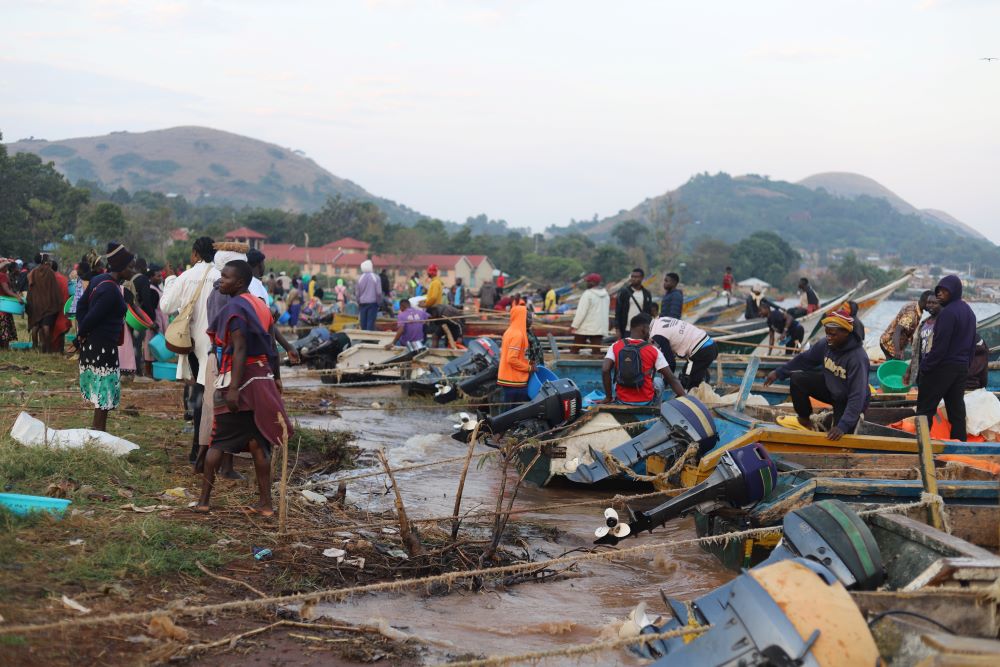
Fishing boats return laden with tilapia, Nile perch, silverfish and other local species at Port Victoria, Kenya, on July 17. Along Lake Victoria, children under 18 participate in fishing activities to help support their families after dropping out of school. (GSR photo/Doreen Ajiambo)
"I had no other option because I was living with my grandmother, and she needed money to sustain us," explained the 17-year-old girl, who had dropped out of school at the age of 12. "I became pregnant with a man of 42 years and gave birth at age 15. Life has been hard because I am supposed to care for the child, and the only way is still to go back to these fishermen."
Interventions
Religious sisters in the region, along with local officials and NGOs, have classified fishing as a hazardous child labor activity. This classification prohibits employing children under age 18 in this occupation. The sisters believe that this is an important step towards ultimately eliminating child labor in fishing, although they acknowledge that numerous obstacles remain, especially in convincing children and parents themselves.
Nthenya said that she had already begun raising awareness among the fishing community about the risks of child labor. She also emphasized the need for parents to fulfill their roles in addressing these crucial issues.
"There's a high level of illiteracy in this area, and many parents here never received an education," she said. "As a result, they may not understand the importance of education." Nthenya added that they hold meetings with parents and children every Sunday at parishes across the region to educate them about the significance of sending their children to school and combating child labor.
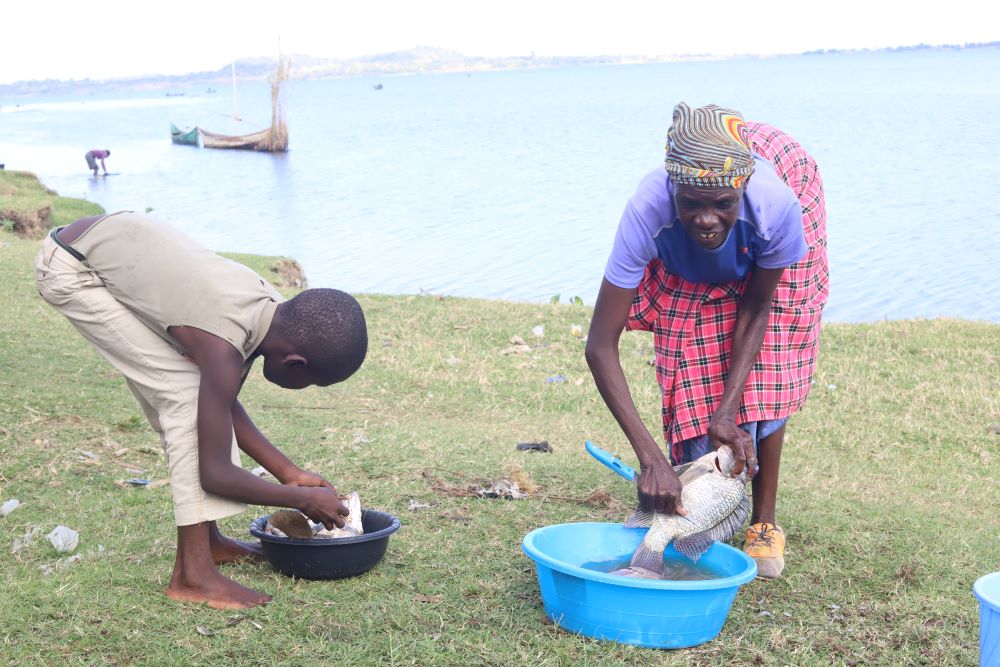
A child assists her mother in removing scales from fish they caught in Lake Victoria before selling them at the local market in Kisumu, southwestern Kenya, on Nov. 5, 2021. (GSR photo/Doreen Ajiambo)
"We also educate both parents and children about the abuse that occurs in the community so that they can report it to the police or assist us in protecting the children," Nthenya said. She stressed that raising a child is a responsibility of the entire community, and everyone needs to be involved to help these children and secure their lives.
Odera stated that his office had instructed the police to apprehend individuals who were exploiting young children for cheap labor, prioritizing economic gains over the well-being of the minors.
Sr. Jancy Paul Chiramel, who operates St. Mary's Sirimba Mission School to promote education for girls and boys around Lake Victoria, said that her school diligently seeks donors to offer educational scholarships to underprivileged children in the region.
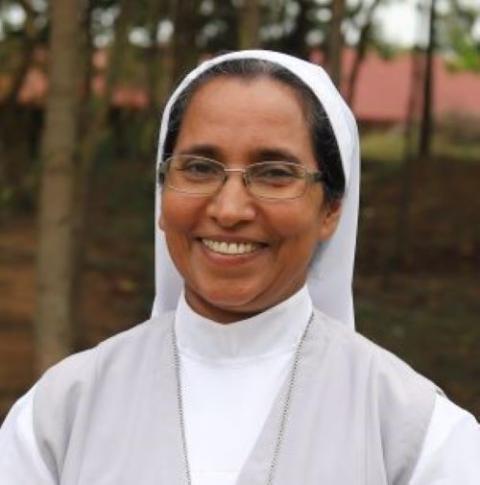
Sr. Jansy Paul Chiramel, a member of the Missionary Sisters of St. Ann, Luzern, oversees the operations of St. Mary’s Sirimba Mission School. (GSR photo/Doreen Ajiambo)
"We have consistently reached out to donors who have assisted us in sponsoring hundreds of children by covering their school fees," she explained. She also noted that they provide food, particularly lunch, for the day scholars to encourage their attendance in classes.
Chiramel, of the Missionary Sisters of St. Ann, Luzern, said that the sisters offer vital guidance and counseling to parents and children involved in fishing activities, addressing the underlying issues of stress, poverty and lack of knowledge.
"We have weekly seminars in this region to encourage children to never give up on education. We also encourage those who have dropped out of school to accept re-enrollment. For girls who have already given birth, we advise them to enroll in vocational training to secure their futures," she said.
"I believe that providing education to our society will help end vices like child labor, prostitution and early marriages."
Advertisement





